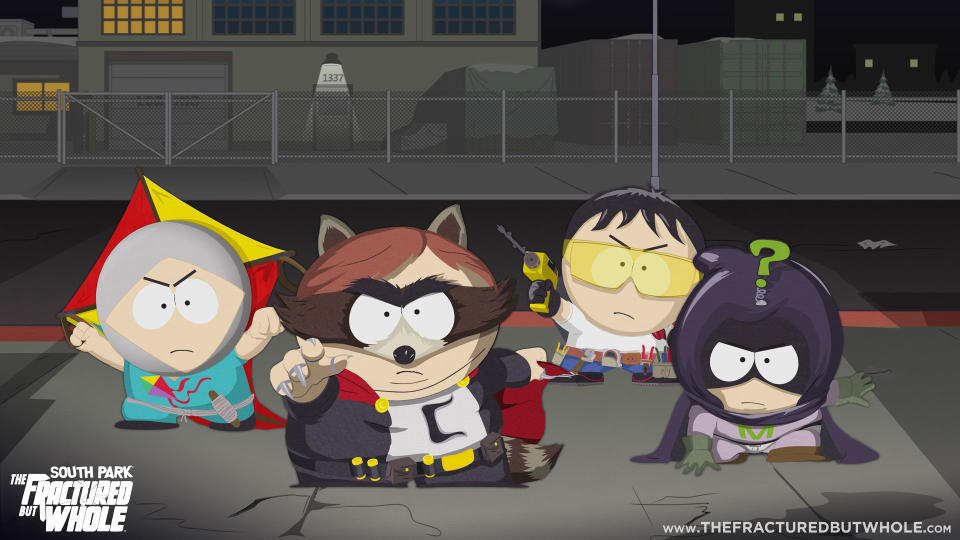Don’t bother playing ‘South Park’ unless you’re a die-hard fan
Nothing to see here if you don't watch the show.
"South Park used to be a lot funnier," I catch myself thinking as I play through the franchise's latest game, The Fractured But Whole (TFBW). Maybe I'm just too old, or has the world moved on while South Park stayed the same? Humor is crucial to the success of the game, which relies on superficial mechanics and an overload of fetch quests and collectibles to pad its length; It's TFBW's jokey tone and writing that hold the game together. But if you aren't already a fan of the show, there's little reason to play the game.
TFBW is a direct sequel to 2014's The Stick of Truth (TSOT) and inherited a lot of its structure and style (along with South Park's signature color-paper look). You're still romping around the title town, which is laid out roughly the same. Old exploration-impeding obstacles have been swapped out for new ones. Instead of old-school turn-based RPG combat suiting the first game's faux-fantasy theme, the sequel swaps magic out for heroic powers and fans the action out on a grid-like XCOM-lite, which fits its superhero setting. You collect a lot of tchotchkes and don't really know why.
But central to the game's quality is whether the jokes land. I haven't regularly watched South Park in a decade and its style of humor seems unchanged. As Kotaku points out, the show's style paints almost everything as equally absurd, which was fine when edgy critics pointedly criticized everyone from the sidelines. But mocking folks for taking issues seriously isn't that fashionable anymore — more comedy today embraces diverse outlooks. Critics acknowledge that they've got a horse in the race.
Which isn't to say the writing is completely tone-deaf. There are plenty of jokes that land, like the young Tweek's dad mending his son's relationship with another boy because "having a gay son is great for the coffee business." Eviscerating petty and selfish human motives is the best kind of South Park joke, but it's hit or miss in the game. It's tonally uneven for The Fractured But Whole to thoughtfully integrate a gender-identity/redefinition subplot only for the player to beat up black dads on behalf of the bigoted police chief without any consequences or self-awareness. White cops pinning crimes on innocent people because they're black was an edgy punchline in the show's distant past (from the first Michael Jackson episode, IIRC), but it sticks out as dated comedy here.
That lack of awareness applies to the South Park franchise itself. The Stick of Truth gleefully poked fun at the stuffy fantasy genre and blended it with the arbitrariness of childhood make-believe, ribbing the equally illogical concepts of turn-based combat and magic. But South Park's best moments address how its young cast sees the world differently than adults, like a perverse take on Calvin and Hobbes' dichotomy. In the episode that inspired TSOT's fantasy setting, the Lord of the Rings-obsessed kids perceive a film as evil for perverting their friends and undertake a quest to return it to the video store -- but the adults and others, realizing the youngsters are taking back a porn film, hound the faux-fellowship. It's brilliant writing that fits the show, mockery with appreciation. Both it and (to a lesser extent) TSOT have a sublime time exploring childhood imagination juxtaposed with adult truths.
The Fractured But Whole is a similar media satire that critiques the consumerist mess of modern superhero films, but it leans hard on fewer jokes. The Stick of Truth made fun of its source material from a place of love and understood its target, but TFBW doesn't much care about the niche it's criticizing and guns for low-hanging fruit. Seriously, count how many times the multiphase, TV-Netflix-feature film-crossover joke is made -- a gag that was stale to begin with. That's because superhero media isn't a robust industry -- it's a gold rush on wobbly legs, which became a surprise juggernaut a little under a decade since the first Iron Man film rang in the era of connected universes. Film critic A.O. Scott was premature to suggest in the same year that audiences would soon tire of superhero films and they'd go the way of the Western, but TFBW portrays superhero media as a monolith bamboozling the public into consuming crappy, derivative stories, ergo worth taking down a peg.
That's a misunderstanding of why fans enjoy superheroes. We've always known comic books were stupid, and it's obvious to anyone that big studios are leaping to adapt popular graphical characters to make a buck. All superhero films and TV series inevitably compromise the stories and characters that appear in print in order to cram them into the silver screen. TFBW mocks facades and tropes, not the paradoxically honest reasons we keep coming back to thin, outlandish superhero stories. That's where South Park feels like it's lost its clever edge as it keeps making the same jokes over and over.
If you want a carnival tour of the South Park universe with some light tactical gameplay and a few laughs, The Fractured But Whole is a fine game. Just don't expect it to move the needle or stretch beyond the same punching bags the show has been hammering for the last decade.


